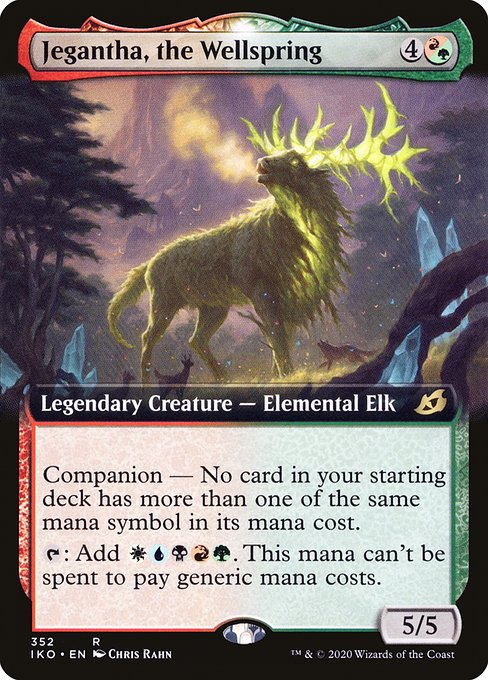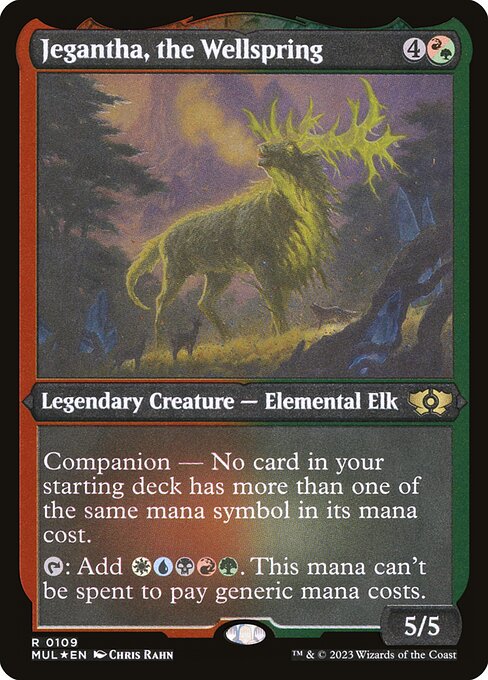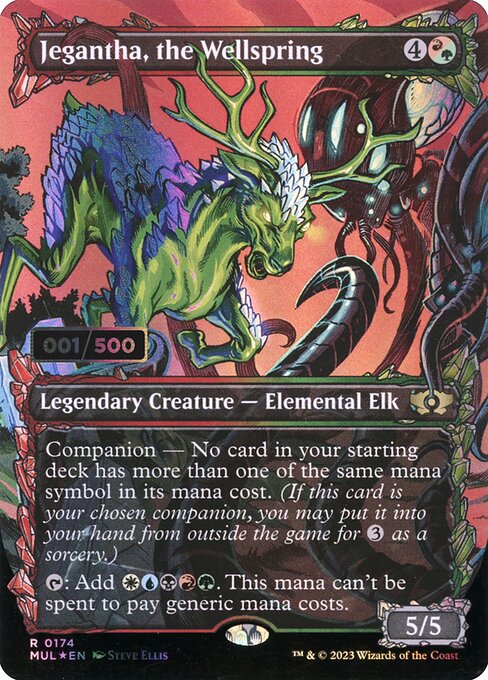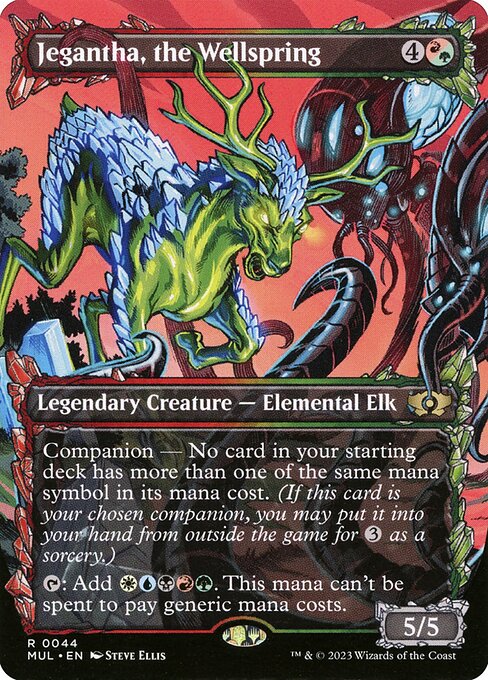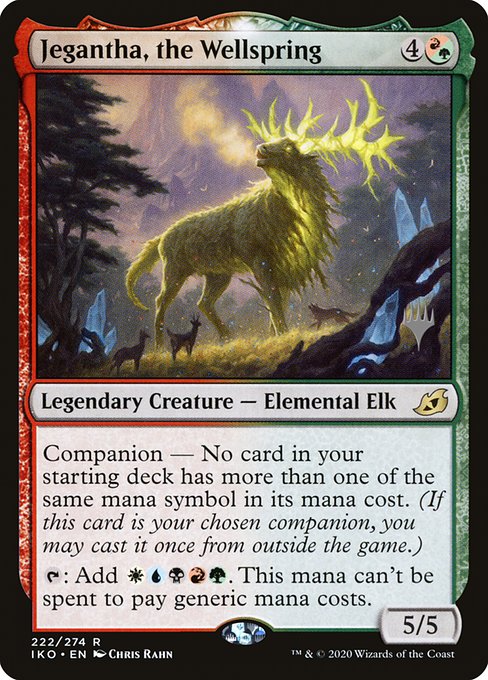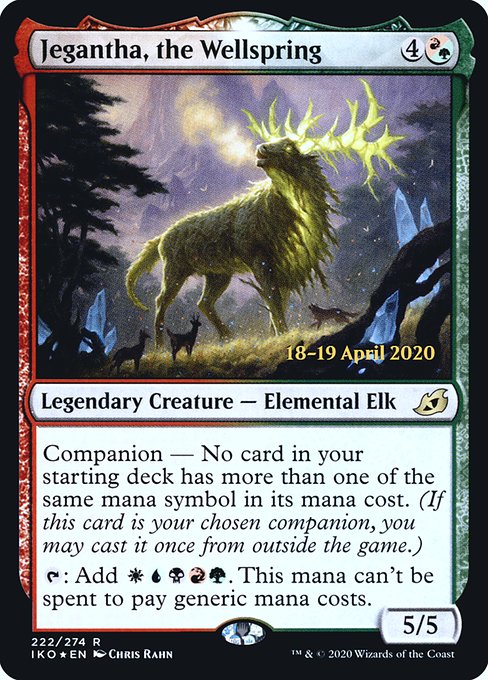Jegantha, the Wellspring
Legendary Creature — Elemental Elk
Companion — No card in your starting deck has more than one of the same mana symbol in its mana cost. (If this card is your chosen companion, you may put it into your hand from outside the game for as a sorcery.)
: Add . This mana can't be spent to pay generic mana costs.
: Add . This mana can't be spent to pay generic mana costs.
5/5
standard
future
historic
gladiator
pioneer
explorer
modern
legacy
pauper
vintage
penny
commander
brawl
alchemy
paupercommander
duel
oldschool
premodern
Rulings
The companion ability has no effect if the card is in your starting deck and creates no restriction on putting a card with a companion ability into your starting deck. For example, Zirda may be in your starting deck even if your other permanent cards don’t all have activated abilities.
If more than one player wishes to reveal a companion, the starting player does so first, and players proceed in turn order. Once a player has chosen not to reveal a companion, that player can’t change their mind.
The requirements of the companion ability apply only to your starting deck. They do not apply to your sideboard.
You may have one companion in the Commander variant. Your deck, including your commander, must meet its companion requirement. Your companion is not one of your one hundred cards.
Your companion begins the game outside the game. In tournament play, this means your sideboard. In casual play, it’s simply a card you own that’s not in your starting deck.
The companion’s other abilities apply only if the creature is on the battlefield. They have no effect while the companion is outside the game.
Jegantha’s companion ability compares the exact symbols in the mana costs of cards in your deck. If any one card has the same symbol twice, such as or , the companion condition isn’t satisfied.
A generic mana cost is usually represented by numeric mana symbols (, , and so on) and also . It is any cost requiring mana where that cost isn’t , , , , , or .
Before shuffling your deck to become your library, you may reveal one card from outside the game to be your companion if your starting deck meets the requirements of the companion ability. You can’t reveal more than one. It remains revealed outside the game as the game begins.
Wizards of the Coast has issued functional errata for the Companion mechanic. Instead of casting companions from outside the game: Once per game, any time you could cast a sorcery (during your main phase when the stack is empty), you can pay to put your companion from your sideboard into your hand. This is a special action, not an activated ability. It happens immediately and can’t be responded to. It can’t be countered or stopped by cards like Phyrexian Revoker. For more information please see https://magic.wizards.com/en/articles/archive/news/june-1-2020-banned-and-restricted-announcement
Once you put your companion into your hand, it behaves like any other card you’ve brought into the game. For example, if it’s countered or destroyed, it’s put into your graveyard, remaining in the game.
You can spend mana from Jegantha’s mana ability to pay for a hybrid symbol such as , but only if you choose to pay the colored mana component, not the generic mana component.
If more than one player wishes to reveal a companion, the starting player does so first, and players proceed in turn order. Once a player has chosen not to reveal a companion, that player can’t change their mind.
The requirements of the companion ability apply only to your starting deck. They do not apply to your sideboard.
You may have one companion in the Commander variant. Your deck, including your commander, must meet its companion requirement. Your companion is not one of your one hundred cards.
Your companion begins the game outside the game. In tournament play, this means your sideboard. In casual play, it’s simply a card you own that’s not in your starting deck.
The companion’s other abilities apply only if the creature is on the battlefield. They have no effect while the companion is outside the game.
Jegantha’s companion ability compares the exact symbols in the mana costs of cards in your deck. If any one card has the same symbol twice, such as or , the companion condition isn’t satisfied.
A generic mana cost is usually represented by numeric mana symbols (, , and so on) and also . It is any cost requiring mana where that cost isn’t , , , , , or .
Before shuffling your deck to become your library, you may reveal one card from outside the game to be your companion if your starting deck meets the requirements of the companion ability. You can’t reveal more than one. It remains revealed outside the game as the game begins.
Wizards of the Coast has issued functional errata for the Companion mechanic. Instead of casting companions from outside the game: Once per game, any time you could cast a sorcery (during your main phase when the stack is empty), you can pay to put your companion from your sideboard into your hand. This is a special action, not an activated ability. It happens immediately and can’t be responded to. It can’t be countered or stopped by cards like Phyrexian Revoker. For more information please see https://magic.wizards.com/en/articles/archive/news/june-1-2020-banned-and-restricted-announcement
Once you put your companion into your hand, it behaves like any other card you’ve brought into the game. For example, if it’s countered or destroyed, it’s put into your graveyard, remaining in the game.
You can spend mana from Jegantha’s mana ability to pay for a hybrid symbol such as , but only if you choose to pay the colored mana component, not the generic mana component.
Rulings
The companion ability has no effect if the card is in your starting deck and creates no restriction on putting a card with a companion ability into your starting deck. For example, Zirda may be in your starting deck even if your other permanent cards don’t all have activated abilities.
If more than one player wishes to reveal a companion, the starting player does so first, and players proceed in turn order. Once a player has chosen not to reveal a companion, that player can’t change their mind.
The requirements of the companion ability apply only to your starting deck. They do not apply to your sideboard.
You may have one companion in the Commander variant. Your deck, including your commander, must meet its companion requirement. Your companion is not one of your one hundred cards.
Your companion begins the game outside the game. In tournament play, this means your sideboard. In casual play, it’s simply a card you own that’s not in your starting deck.
The companion’s other abilities apply only if the creature is on the battlefield. They have no effect while the companion is outside the game.
Jegantha’s companion ability compares the exact symbols in the mana costs of cards in your deck. If any one card has the same symbol twice, such as or , the companion condition isn’t satisfied.
A generic mana cost is usually represented by numeric mana symbols (, , and so on) and also . It is any cost requiring mana where that cost isn’t , , , , , or .
Before shuffling your deck to become your library, you may reveal one card from outside the game to be your companion if your starting deck meets the requirements of the companion ability. You can’t reveal more than one. It remains revealed outside the game as the game begins.
Wizards of the Coast has issued functional errata for the Companion mechanic. Instead of casting companions from outside the game: Once per game, any time you could cast a sorcery (during your main phase when the stack is empty), you can pay to put your companion from your sideboard into your hand. This is a special action, not an activated ability. It happens immediately and can’t be responded to. It can’t be countered or stopped by cards like Phyrexian Revoker. For more information please see https://magic.wizards.com/en/articles/archive/news/june-1-2020-banned-and-restricted-announcement
Once you put your companion into your hand, it behaves like any other card you’ve brought into the game. For example, if it’s countered or destroyed, it’s put into your graveyard, remaining in the game.
You can spend mana from Jegantha’s mana ability to pay for a hybrid symbol such as , but only if you choose to pay the colored mana component, not the generic mana component.
If more than one player wishes to reveal a companion, the starting player does so first, and players proceed in turn order. Once a player has chosen not to reveal a companion, that player can’t change their mind.
The requirements of the companion ability apply only to your starting deck. They do not apply to your sideboard.
You may have one companion in the Commander variant. Your deck, including your commander, must meet its companion requirement. Your companion is not one of your one hundred cards.
Your companion begins the game outside the game. In tournament play, this means your sideboard. In casual play, it’s simply a card you own that’s not in your starting deck.
The companion’s other abilities apply only if the creature is on the battlefield. They have no effect while the companion is outside the game.
Jegantha’s companion ability compares the exact symbols in the mana costs of cards in your deck. If any one card has the same symbol twice, such as or , the companion condition isn’t satisfied.
A generic mana cost is usually represented by numeric mana symbols (, , and so on) and also . It is any cost requiring mana where that cost isn’t , , , , , or .
Before shuffling your deck to become your library, you may reveal one card from outside the game to be your companion if your starting deck meets the requirements of the companion ability. You can’t reveal more than one. It remains revealed outside the game as the game begins.
Wizards of the Coast has issued functional errata for the Companion mechanic. Instead of casting companions from outside the game: Once per game, any time you could cast a sorcery (during your main phase when the stack is empty), you can pay to put your companion from your sideboard into your hand. This is a special action, not an activated ability. It happens immediately and can’t be responded to. It can’t be countered or stopped by cards like Phyrexian Revoker. For more information please see https://magic.wizards.com/en/articles/archive/news/june-1-2020-banned-and-restricted-announcement
Once you put your companion into your hand, it behaves like any other card you’ve brought into the game. For example, if it’s countered or destroyed, it’s put into your graveyard, remaining in the game.
You can spend mana from Jegantha’s mana ability to pay for a hybrid symbol such as , but only if you choose to pay the colored mana component, not the generic mana component.
Your collection? Your decks?
Want to manage your collection and/or create decks?
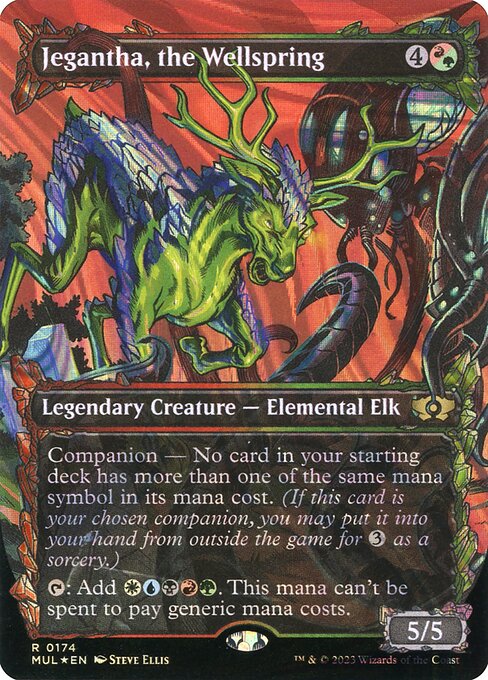

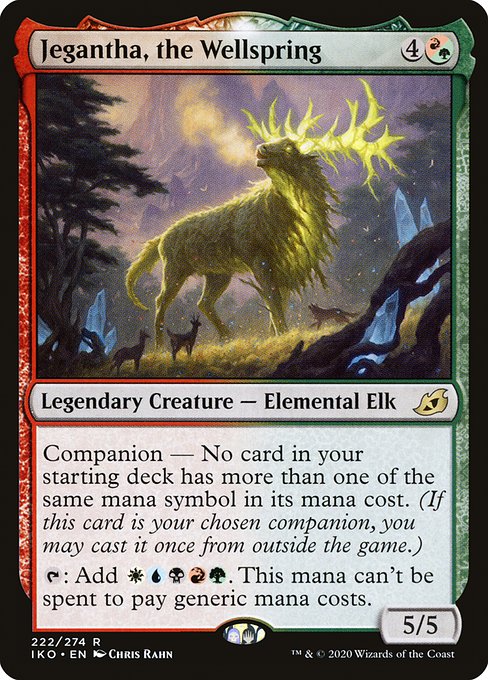
 0
0
 0.85€
0.85€
